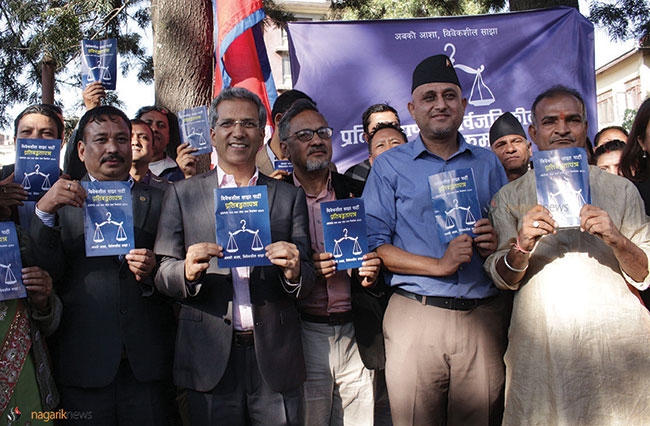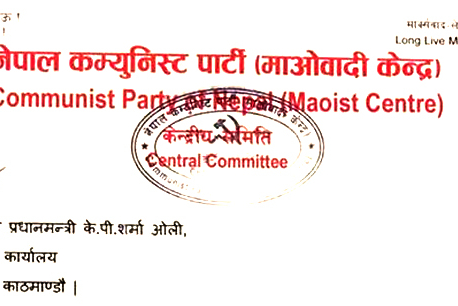
OR
If anybody has the power to convene and lead a civil society movement, you do. I encourage you to reject the allure of political power to drive change
Dear Bibeksheel Sajha Party members:
Don’t be disappointed that you did not secure enough votes and seats in the recent elections to become a national party. Setbacks are often a springboard to success. I hope you can summon the courage to overcome this setback as well.
We are all rooting for you. All of us need you to succeed in your quest to catalyse and sustain positive change.
I was first touched by your party’s movement in the immediate aftermath of the April 2015 earthquakes. You mobilized with great speed and intent. As government rescue efforts faltered, you tapped into a network of supportive Nepalis, gathering volunteers beyond just party members. You displayed tremendous reach, partly because of the skilful use of social media but also because people were willing to rally around your efforts.
Many were drawn to your earthquake relief efforts for the remarkable genuineness it demonstrated. There was an unabashed air of selflessness, something that was missing from even the best international efforts that came to Nepal’s aid at the time. Amidst the pain of the devastating earthquake, I, like many others, were in awe of your efforts—your ability to inspire volunteerism and collaborative action despite your obvious lack of resources and infrastructure.
Your efforts filled us with hope. The genesis of a social movement that drew strength from common civilians appeared to be emerging from among the ruins.

Two years later as the vote count of the recent elections streamed in, I asked a few that had voted for your party why they had chosen to do so. Bibeksheel Sajha party, they felt, would be more honest in politics. They could deliver better governance and drive change. Everyone echoed more or less these same sentiments.
No one, not one, spoke about your energetic and inspiring earthquake relief efforts as the basis of their support. Forget them, even you didn’t mention it once during your campaigns.
Your electoral loss wasn’t unexpected. But as I listened to your leadership and adoring fans talk about how they intended to continue the fight as a political party, I realized we had lost something essential.
The sparkle of hope for a civil society movement that had surfaced as you rallied ordinary citizens to support earthquake victims faded. Your electoral campaigns and subsequent commitment to pursue political power made it clear that you see political power as the essential vehicle for driving change.
I recognize that this open letter is unsolicited advice. I have no authority to tell you what to do. But I do hope that you can give the case for a civil society movement a considered hearing.
I return to the hope that you sparked from your earthquake relief efforts. If anybody has the power to convene and lead a civil society movement, you do.
I encourage you to reject the allure of political power to drive change.
Instead, return to your homes and offices, resume life as ordinary citizens and band together a civil society movement that can partner with government to catalyse and sustain change.
Force of civil society
There is no doubt that we need better and cleaner political leadership. Honest and able candidates that your party fielded, for instance, I’m sure, could lead governments with integrity. As we mature as a democracy, I hope we are able to elect better leaders.
But our future cannot be held ransom to electoral outcomes alone. With the new constitution we have an opportunity as citizens to exert influence in ways that was never possible before: to make governments work for us and accountable to us in a continuous process beyond just the casting of a vote. For that, we need to be organized, as civil society free from the encumbrances, expectations and bondage of political power.
A civil society movement must pull from across the different strands of society, enabling citizens to ensure that government remains accountable. It is different from a special interest group, which might actively advocate for a specific law or regulation. A civil society movement, on the other hand, must remain tenaciously neutral with no aspirations for political power. It must afford all branches of government the space to make political decisions but safeguard and enforce accountability.
Nepal currently lacks a meaningful civil society movement, reflecting perhaps the high level of politicization and culture of patronage. But many of Nepal’s current and most pressing challenges cannot be resolved by government alone, no matter how honest or able the leader. These challenges can only be resolved through our active participation—not as members of a political party—but as ordinary citizens banding together towards a common purpose.
Stopping corruption
Corruption currently remains the single largest risk to our progress. All of our political and social gains could unravel if we are not able to rapidly contain and stop corruption. A civil society movement could address this challenge in two ways.
First, a shadow civil society government. Corruption has been high, in part, because it has had a free run. No one is watching. Institutions that were to keep watch were colluding.
Civil society could offer a new mechanism of oversight by establishing a shadow government, one that could track government activities across ministries and departments. The purpose of shadow government isn’t to encroach on government decision making or functioning. It must remain in the shadows, collecting and broadcasting the information to ensure that government’s decision making remains fair and honest.
Allowing a shadow government of civil society would require government to acknowledge and support its presence. Despite the overhang of corruption, the current mood in Nepal is conducive. If civil society were organized enough to form a shadow government, the incoming government could provide access to a civil society based shadow government. Even if they didn’t, government could still be prodded to host a shadow government because of openings under the right-to-information act or by accessing the judiciary.
Second, a name-and-shame campaign to block the supply side of corruption. A large part of the driver of corruption in Nepal are private sector businesses. They have relished this period of uncertainty, exploited the political instability and demonstrated, sometimes quite publicly, the willingness to purchase political influence.
Civil society must also get more active in helping to reduce the supply of corruption from private sector businesses. It could do this by encouraging private sector business to be more forthcoming and transparent on their business operation. Whistle blower policies, that provide a safer environment for reporting on corruption, could also be implemented. While civil society has no punitive authority, it could initiate name and shame campaigns that provide citizens a safe environment to investigate and report on cases of corruption.
These are not the only set of activities that civil society movement could pursue. There are many more, for example on how civil society can support the truth and reconciliation of the insurgency, how they can heal the current divide between different groups and ethnicities.
Leading a civil society movement is a thankless job. There are no red-beacon cars as escorts. No official bodyguards or security detail. But there is a clear opportunity to drive the biggest changes of our history.
Bishal_thapa@hotmail.com
You May Like This

Sajha, Bibeksheel unify to become Bibeksheel Sajha Party
KATHMANDU, July 25: Newly-emerged alternative political parties -- Bibeksheel Nepali Dal and Sajha Party -have unified to become Bibeksheel Sajha Party... Read More...

A LETTER TO MY DAUGHTER
I feel so lucky and blessed to have you, in my life. My world changed since the day you came... Read More...

The letter that marked Maoist-UML divorce
KATHMANDU, July 12: After deciding to pull out of the government, the CPN (Maoist Center) Chairman Pushpa Kamal Dahal sent... Read More...

Just In
- Global oil and gold prices surge as Israel retaliates against Iran
- Sajha Yatayat cancels CEO appointment process for lack of candidates
- Govt padlocks Nepal Scouts’ property illegally occupied by NC lawmaker Deepak Khadka
- FWEAN meets with President Paudel to solicit support for women entrepreneurship
- Koshi provincial assembly passes resolution motion calling for special session by majority votes
- Court extends detention of Dipesh Pun after his failure to submit bail amount
- G Motors unveils Skywell Premium Luxury EV SUV with 620 km range
- Speaker Ghimire administers oath of office and Secrecy to JSP lawmaker Khan

















_20240419161455.jpg)
Leave A Comment